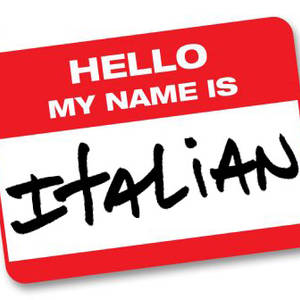Most Italian-Italians, the ones from Italy, that is, always seem to be curious as to how we Italian-Americans are perceived by others in America. With all the news they’ve heard of Italian stereotypes in America, like the ones put forward in “The Godfather,” “The Sopranos,” “Mafia Wars,” and “The Jersey Shore,” I understand what they expect.
You chose: mtv
-
-
Editors’ Note: We do not doubt that the media can and have had a dilatory effect on how certain members of society may look upon others. We also realize that Italian Americans may indeed be the last punching bag for ethnic bigots in various venues. We also understand the outrage that some have expressed toward the MTV show “Jersey Shore.” What we do not understand is the truculent, vituperous, and visceral bile that has spewed forth from some people and local organizations against this program. In our opinion, two objections have proven to be thoughtful and well reasoned, regardless of whether one may agree or disagree with the reasoning offered. The first was the December program of Italics, the Italian American Magazine (now available at http://www.cuny.tv/series/italics/index.lasso), in which Andre DiMino, president of UNICO National, spoke quite eloquently to the issue at hand, underscoring what he saw as the major problems with this and other mediatic representations of Italian Americans. The second appears below, the Press Release that the National Italian American Foundation recently sent out to various news organizations and associations. We have decided to share it with our readers of i-Italy.org, precisely because of its temperate tone and acknowledgement that Italian America indeed is more pluralistic than others might think.
-
If you believe that the “Jersey Shore” show of MTV is really gangsters without guns, then you should do something about it. But since when have we become afraid of our youth? Since when has the public behavior of seven 20-something kids been something to pay attention to? This shows that kids don’t really know what it means to be Italian American outside of their family; it also shows that we probably don’t know our kids as well as we think we do. ... So don’t blame MTV; we have failed ourselves. We may think we have created Italian America, but we have yet to create Italian Americans.
-
I am not sure why mimicking the guido style is any better or worse than folks in a previous generation trying to be like James Dean or the pre-Godfather Marlon Brando. It is one generation’s rebellion against the previous generation. And it was the disobedience and unruly behavior, now “forgotten”, that helped to make Sinatra an icon for a particular generation. This rebellion is needed to move toward establishment of identity as a new group that is independent from the previous generation. It is outrageous that anyone should claim a specific topic is forbidden ground for interchange. It is in the reasoned discussions about such topics as guido culture that can help us as a community reach a consensus.
-
Why has MTV produced a youth culture reality show that showcases Guido and Italian identity? Guido offers a symbol that specifically identifies the brand; Italian ethnicity makes the brand more salient. Guido combines a commodified youth party culture with a style that has street culture roots. [...] Guido is a struggle for recognition and respect by an age fraction that privileges consumption rather than formal education, reflecting class differences in an ethnic culture that continues to evolve in metropolitan New York City and throughout the Northeast. [...] Youth may turn more to ethnicity to authenticate their cool and preserve privileged insider status as in Hip Hop. However, this is denied by a vocal anti-defamation position that reduces Guido to a category of ethnic prejudice. It is my view that this slights a vernacular Italian American culture that ironically is better defined as a challenge to generalizations and stereotypes that underpin historic ethnic slurs.
-
-
On Saturday afternoon a hundred or so people, among whom several leaders of Italian-American associations, community activists, and elected officials, gathered at the Seaside Heights Community Center on Jersey Shore to voice their protest against MTV’s “Jersey Shore” reality show
-
This colloquium is not about the MTV show “Jersey Shore” and it does not justify it in any manner. This colloquium is about the phenomenon of the “Guido” that, regardless of its merits or lack thereof, has its origins and is associated with Italians in America. Whether one likes it or not, this component of Italian-American youth—an articulation of cultural expression, call it what one wishes—does exist. We are not asking anyone “to accept” this or any other “sub-culture” that may exist in the Italian-American community. Yet, precisely because this culture has been show-cased on television, and precisely because it has remained unknown to many, we need to be sure that we can speak to it in an informed manner.
-
Facts & StoriesThe Director of “Pane Amaro” (Bitter Bread), an acclaimed doumentary about the life and history of early Italian immigrats in the U.S., talks about whether sweeping dirt under the rug is the way to deal with undesirable facts. His film touched upon several diffucult topics, including he lynching of thirty-nine Italian immigrants across the United States between 1886 and 1916. “Occasionally you do find some people who, when faced with difficult, uneasy subjects, react by closing their eyes; they prefer not to know about them and even try to prevent you from talking about them. They use a metaphor, you know, they say that we shouldn’t ‘wash our dirty laundry in public’. And I think it doesn’t advance the conversation. I do believe that we need to explore difficult issues such as this."
-
'Guido' is a phenomenon that demands attention. If Italian American social advance were as real, as secure, and as substantial as many Italian Americans believe it to be (I am among these believers), then it would seem not only not harmful, but indeed positively beneficial and necessary, to examine, to discuss, and to reflect upon the power of such a new word. As to the youths of Jersey Shore, they are playing grotesques, like all minstrel-show caricatures. They are amusing—indeed, more so than most clowns with sad eyes. They have clearly found their moment and clearly touched a nerve. To the term Italian American, which has carried so many strings of dollar bills and ropes of sausage, they have added a new chain of fetishes – a tanning bed, a tube of gel, an old summer thong bearing the legend “I Love the Situation.”






































